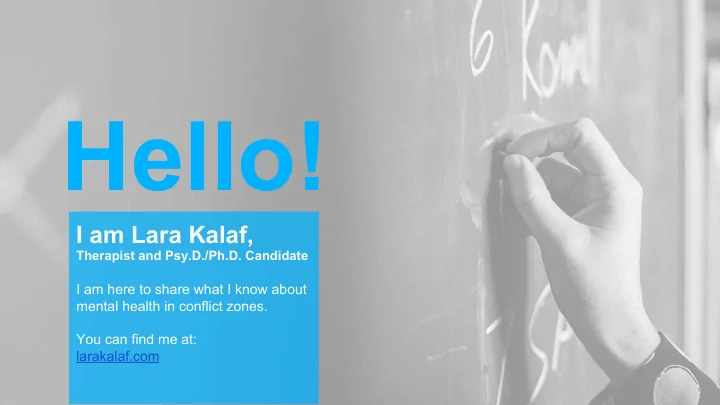

Hello! I am Lara Kalaf, Therapist and Psy.D./Ph.D. Candidate I am here to share what I know about mental health in conflict zones. You can find me at: larakalaf.com
A PHENOMENOLOGICAL EXPLORATION OF AN ARTISTIC WORKSHOP ABOUT RESILIENCE FOR WAR-AFFECTED YOUTH
230,000,000 children live in areas affected by armed conflict 30,000,000 have been forcibly displaced 6,000,000 have been severely injured or permanently disabled (UNICEF, 2015)
The ‘Treatment Gap’ Source : Saxena, Thornicroft, Knapp, & Whiteford, 2007
A POSITIVE INTERVENTION THAT CAN PROMOTE WELLBEING AND PREVENT DYSFUNCTION
State of knowledge on war-affected youth 12029 225 4 6139 49 Youth Youth Youth Youth Youth Wellbeing Wellbeing Art Art Art War Wellbeing War War
Research Objective To examine the lived experience of war- affected youth with expressive arts after participating in a creative workshop about resilience
CREATING A STOP MOTION MOVIE What are the positive experiences you remember (ex: moments of strength or joy) and events or people who helped you cope since the start of the conflict?
The ‘Art 4 Lives’ Workshop Steps 1. Introduction and orientation (first day) 2. Discussions and reflections (art therapy) 3. Creating the storyline 4. Drawing/painting frames 5. Compiling frames 6. Closing- Interviews
The Team ➜ Researcher - facilitator ➜ Animation expert ➜ Art therapist ➜ Interpreter ➜ Volunteers ➜ Media team All must have experience working with war-affected youth and will be briefed about ethical guidelines of working with them.
Ethical Considerations
Positive Psychology Linking expressive therapies to resilient outcomes
The ecological variables mediating resilience for war affected youth Risk Factors Protective Factors ● Personal ● Resilient Traits characteristics (age, ● Positive coping male, low birth weight, ● Political awareness or malnourishment) activity ● Attitudes towards ● Exposure to violence mental health care ● Deprivation ● Education ● Examining dreams ● Forced displacement ● Family composition ● Family support & ● Family ties resources ● Poor parental MH ● Maternal education/ health ● Family - new ● Positive relationships & community relations social support ● Faith (religious) ● Cultural meaning war Figure 1: The bio-ecological model of human development Source: https://jeremypmyers.files.wordpress.com/2011/11/bronfenbeenners20ecological20system.jpg
The ecological variables mediating resilience through expressive therapies Risk Factors Protective Factors ● Personal ● Resilient Traits characteristics (age, ● Positive coping male, low birth weight, ● Political awareness or malnourishment) activity (meaning) ● Attitudes towards ● Exposure to violence mental health care ● Deprivation ● Education (purpose, hopefulness) ● Forced displacement ● Examining dreams ● Family composition ● Family ties ● Family support & ● Poor parental MH resources ● Maternal education/ ● Family - new health community relations ● Positive relationships & social support ● Faith (religious) ● Cultural meaning war Figure 1: The bio-ecological model of human development Source: https://jeremypmyers.files.wordpress.com/2011/11/bronfenbeenners20ecological20system.jpg
“Creative thought and expression is a right every child should have.” - Jalongo, 2003
Thank you. Get in touch with me by mail : ➜ lara@larakalaf.com Check my website : ➜ www.larakalaf.com Follow #art4lives on social media: ➜ #art4lives on facebook : www.facebook.com/art4lives ➜ #art4lives on twitter : www.twitter.com/louleestar
Recommend
More recommend